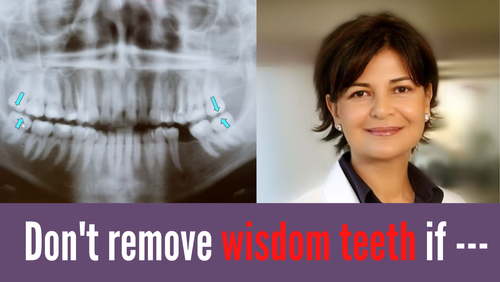Today we got a very special guest, Dr. Wisdom's teeth.
I'm going to cover four conditions that you. When if you have any of those, you want to have a second thought before deciding about the removal of your business is okay.
1. Wisdom Teeth
If you have wisdom teeth, you may be wondering if it's possible to remove them. Well, there are two conditions that must be met before a dentist can perform a removal:
First, you have to have fully erupted wisdom teeth in your mouth. This means they are visible and fully developed. If they are not fully developed, then they need more time to grow out of the gum tissue and develop into teeth.
Second, the wisdom teeth must be located in the correct position. If they are not positioned correctly (facing forward), then they will cause problems with chewing and food passage, making it impossible for them to function properly in your mouth.
2. You don't have to remove it; listen to it.
Let's talk about wisdom teeth.
If you have them and they're causing problems, there's a good chance your dentist will recommend removing them. But before you go ahead with the procedure, it's important to consider whether or not that makes sense for your situation.
A lot of times, we can treat wisdom teeth without having to remove them. In fact, if they don't cause problems and are just generally healthy, we may recommend keeping them in place until something goes wrong or you decide that it's time for another treatment option.
Here's why: If we remove a wisdom tooth—or any tooth at all—there's always a chance that something unexpected will happen later down the road when we need another treatment option. For example, let's say that over time you end up needing a root canal on one of your wisdom teeth and then lose that tooth altogether; now you have to get an implant instead of just getting a simple filling because the other root canal tooth was removed years ago! It sucks! And it costs more money! And if we had just kept your wisdom teeth intact (or removed only when necessary), this wouldn't happen!
3. Two Top Wisdom Teeth
So, let's talk about the third condition. Yeah, that one can be a little tricky, but I want to make sure that everyone gets it really well so let's talk about the two top wisdom teeth. I've marked them with red dots and the two bottom ones with green arrows. If you look at their position, both sets have points of contact with the second molar on both sides—so if you go to the doctor and he says all four wisdom teeth need to come out, which is what I'd agree with because there isn't enough space for them to grow, then look at what happens when you remove these too. You're losing chewing surface with your second molar in here… and here… and especially on the right side where it's just touching these second little lids. The top one will grow down over time if you remove the bottom ones too! It'll come down and act as an interfering force—it'll be like this!
4. Risk of removal of Vision Feed
Now, the fourth condition is when the risk of removal of vision feed is much more than the benefits of removing it. For example, in this slide, there are three wisdom teeth that can come out. It's okay if this wisdom tooth does not cause a problem and I will elaborate on that later. But you don't want to remove this wisdom tooth if it's far up and there is no bone here to cover it. Look at the thickness of the bone covering that. Just the amount of trauma that is introduced to your TMJ (temporomandibular joint) when a doctor removes so much bone and then pulls out the root touching your sinus—this is your sinus—is too much for me. This is treatable but not pleasant if you don't have to do it; therefore, I would rather not touch these teeth because they are too far up and there's no bone here to cover them.
If you're thinking about getting a wisdom tooth removed and your doctor tells you to go ahead, take a second look at the x-ray.
There are four conditions that are almost always present in wisdom teeth that make them difficult or impossible to remove. If your doctor doesn't mention any of these things and just tells you to get it out, ask them to show you the x-ray—it's a good idea to know what you're dealing with before you go under the knife.
If your doctor says there's nothing wrong with the wisdom tooth and they don't mention any of these four things, it might be worth looking at another opinion before making a decision.

